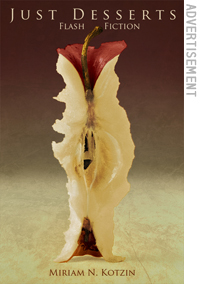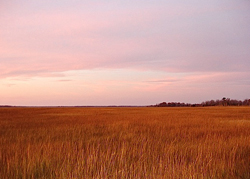Unlike Thoreau, I could not be removed from the ruckus of civilization. No, I could escape for an hour or two at the most, taking advantage of an unexpected return of warm weather to spend some time in a tidal salt marsh. I write this to return to a place where the most regular sounds are the rustle and whisper of the dry reeds and grasses in the late afternoon breeze.
And then birds. Circling, the gulls cry. In this slant of light their white sides glow golden before they plunge out of sight to settle in a hidden channel of water flowing through the high grass of the meadows. Unseen, a sparrow chips at the afternoon. A loud croak announces the presence of a nearby great blue heron, disturbed. Snow geese will winter here and add their clamor to the mix.
But now it is quiet.
I am alien to the marsh. The sound of my own breath annoys me, so I try to breathe more shallowly. It doesn’t work. Instead of concentrating on the light as it glazes the grasses and listening for the occasional chip of the sparrow, I find myself thinking about how I can regulate my breath. And, just as bad, after some time, I take a deep breath and sigh.
Thoreau heard a distant train whistle. Here, no nearby railway intrudes; instead, an airplane’s mechanical whine slices its way into the quiet. The contrail tracks the course of the plane and dissolves. In a while it will vanish. If I had the right cell phone app, I’d be able to hold the phone up and find out where the plane came from and where it’s headed. I don’t need it. I already know all I care to about the plane. It’s far away and going farther.
Seen from this distance, in the late afternoon the woods turn violet at the edge of the autumn gold of the meadows. Above the tree line the sky is the palest peach and mauve. The disturbance in the air just above that tree line isn’t an anomalous tower of rounded clouds among the few streaks of white — it’s a column of steam rising from the nuclear power plant. When the wind changes, the column vanishes, and I wonder if I imagined seeing it. I keep checking every few minutes, like poking an old wound to see if it’s still sensitive. Later the steam returns, unmistakable, rising on the horizon, a ghostly reminder of quotidian need.
•
The goldenrod, on which not so long ago the monarchs fed, has gone to seed. Along with asters, they were among the last wildflowers in bloom. Solidago, as botanists — and florists — call goldenrod, isn’t the hay fever villain of its reputation; it’s just more obvious than the most likely source of irritation, the less-showy ragweed. Anyway, it would be no threat now. By late November, its seeds and white fluff replaced the yellow flowers and maintained the forms of the plumes, no less attractive — and far more fragile.
If I return at the right time, I could see them take sail on the wind. I can spot only a few goldenrod at the edge of a thick stand of common reeds, Phragmites australis.
Like goldenrod, milkweed is associated with monarch butterflies, milkweed being a host plant; however, the butterflies were long gone when I passed a roadside patch of milkweed, their brown seedpods split wide, spilling floss-borne seeds. A gust shook the milkweed, and for a moment the air filled with a white flurry.
To sleep on a pillow stuffed with milkweed floss would be to have sweet dreams.
•
This is the time of the afternoon when on even the hottest days, a breeze arrives from nowhere to stir the leaves, a promise of relief from the heat. In the dog days, the leaves’ trembling is welcome. Besides, then the darkness will not come for hours, and, when I’m lucky, in the last of the light I’ll find the slow rising net of fireflies as they float from the lawn in the gathering dusk.
In the late afternoon the marsh grasses of the meadows change from gold to an apricot that darkens in places to russet. I wait for the certain arrival of a Maxfield Parrish dusk, when much of the light will have drained from the sky. Then, during those moments of perfect balance, it seems that the earth has absorbed light all day long and, luminous, returns it to the evening air. As the shadows lengthen and the marsh salt grass begins to glow, a chill arrives on the wind, and I know the unseasonable warmth is almost at an end.
•
The sunsets here are like giveaway calendar photography: an almost tawdry display. Lines of hot pink clouds float above the horizon and in the stream. Hot pink. Fuchsia. Cerise. Scarlet. I haven’t mastered the trick of watching a sunset without staring at the sun, and when I look away, an aqua spot floats in my field of vision.
I’m surprised when I turn around and find that at my back the clouds still reflect the sunset. The sky is what my mother used to call sky-blue-pink, which only seems like an impossibility: Pink clouds dissolve in the blue sky, and the sky becomes simultaneously pink and blue.
Earlier in the day I’d seen six wild swans “drift on the still water/ Mysterious, beautiful…” like Yeats’ “nine and fifty” at Coole. One pair raised their wings, reminding me both of the swan boats of the Boston Public Garden Lagoon and Swan Lake. Driving home, I pass the body of water where swans had been swimming.
I couldn’t find the swans. On one side of the road where they had been swimming, the water was still high. On the other the tide had gone out leaving little water. The remaining water was host to the blue sky and pink clouds that lay huddled in the pools as though seeking refuge from the oncoming dark.
•
Sometimes the oncoming dark hurtles toward me, and other times it approaches with the steady direction and speed of an inbound subway train.
December is tricky.
I hate December’s short days as I scuttle home in the dark like a beetle into its burrow. The sooner December 21 arrives, the sooner the days will begin to lengthen again.
My task is to learn how to anticipate, to look forward to something without wishing away time. Wishing away time is a lesser suicide: to wish away time is to leap onto the tracks. • 8 December 2010
 |




